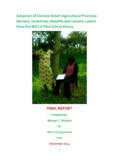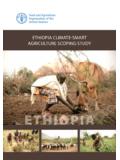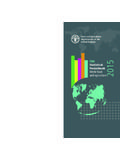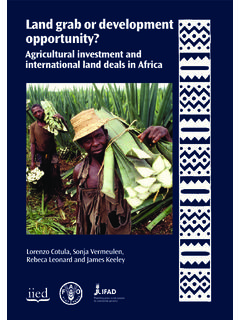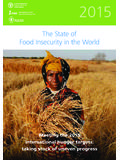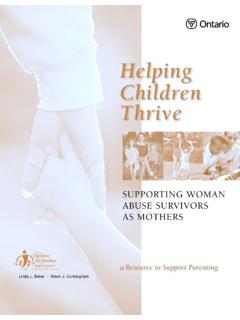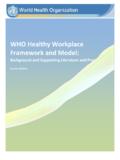Transcription of Why is action needed? - Food and Agriculture Organization
1 Gender and rural employment policy Brief #3rural women s entrepreneurship is good business !Rural women increasingly run their own enterprises, yet their socio-economic contributions and entrepreneurial potential remain largely unrecognized and untapped. They are concentrated in informal, micro-size, low productivity and low-return Enabling and gender responsive policies, services and business environments2 are crucial to stimulate the start up and upgrading of women s businesses and thereby help generate decent and productive work,3 achieve gender equality, reduce poverty and ensure stronger economies and societies. Why is action needed ?Rural women s entrepreneurship can contribute to economic growth in developing countries and clearly represents an untapped potential. For many rural women , entrepreneurship is part of a broader livelihood strategy, often undertaken on a part-time basis, and where it is difficult to separate production and reproduction tasks, as well as market and non market With few employment choices, women often start businesses in highly saturated sectors, in the informal economy and in low-productivity and low return activities, where they benefit from little or no social discriminatory laws, regulations and social norms prevent women from starting and consolidating viable businessesLack of gender analysis, awareness of the issues, and political will can lead to discriminatory practices and gender-blind programmes and policies that perpetuate systemic barriers, fail to respond to women entrepreneurs needs and impede women s in rights and entitlements, whether economic, civil or family are a powerful source of discrimination against women .
2 And can limit their access to and control over resources that are crucial to starting and consolidating a sustainable women entrepreneurs are often thwarted by discriminatory property, family and inheritance laws and practices. Even when those laws and practices are equitable, women are often unaware of their rights to land and other productive resources or fear a backlash within the family or community if they claim you knoW?Micro and small enterprises offer a number of particular advantages for rural women : flexible hours, location in or near women s homes, ease of entry, and links with local markets. However, rural female entrepreneurs also face particular challenges entering new and lucrative markets and expanding their Cooperatives are a prominent form of sustainable enterprise for women in rural areas. When they adopt gender-sensitive practices, they can increase women s empowerment, voice and representation in decision-making, provide a business network, enhance access to markets and services, and (consequently) facilitate economies of from developing countries highlights the importance of non-farm activities in the income-generating portfolio of rural households: the literature indicates that they account for 42% of the income of rural households in Africa, 40% in Latin America and 32% in are twice as likely as women to own a business with employees in developed and developing countries, except in East Asia, where their ownership rates are addition to income generation, entrepreneurship can legitimize rural women s control over resources.
3 This is important since women invest more in food and healthcare for their families and their children s rates of female land ownership can hinder access to financial assets that are necessary to set up a business. Available information suggests that less than 20% of agricultural land holdings in developing countries are operated by women (10% in Western and Central Africa and in the Near East and North Africa).9 ILO/M. Crozet2010 Social norms and attitudes influence women s and men s choices and op-portunities. women s entrepreneurship is not broadly accepted in many soci-eties and women face attitudinal ob-stacles in their starting, consolidating and developing a sustainable business. women often enter a business when they are older, divorced or become household heads. Few young women see business development as an ap-propriate or viable livelihood option. Social norms and attitudes affect the implementation of laws, policies and programmes.
4 Even though relevant laws and regulations may not be dis-criminatory on paper, discrimination of-ten takes place during their implemen-tation (or lack of implementation). 2. women face barriers to education, training and information Widespread illiteracy, low levels of edu- cation and lack of training and business education and experience can limit the capacity of rural women entrepreneurs to consolidate sustainable enterprises. In Bangladesh for example, of rural women entrepreneurs have no formal education, and 17% cannot read or write and use mainly manual skills in their rural infrastructure and services for transport, electricity, and clean water further limit women s access to resources, markets and pub-lic services such as healthcare, and lengthen the time needed for house-hold, reproductive and care This, added to women s considerable agricultural work, creates time con-straints for non-farm business-related activities (including training and seeking information and business services).
5 Since women often operate home- based micro enterprises, lack access to transportation, and may be barred from accessing the same networks as men by societal norms and attitudes, their networks and contacts may remain weak while these are critical to connect entrepreneurs to growth limited access to financial and business services affects the growth of rural women s businessesFew banks operate in rural areas. Although financial institutions have increased access to micro finance in many countries, loans are seldom large enough to enable significant growth of entrepreneurs, particularly in rural areas, often experience difficulties accessing relevant financial products and services due to a lack of appropriate products, information, understanding of their needs and Development Services are not readily available in many rural areas where there is low population density. Where they do exist, women may not access them due to low literacy, education, time, cost and mobility constraints or because these services do not serve their specific needs.
6 women are left to rely on friends and family for management decisions and other support to their women s businesses are largely informal, failing to meet the decent work requirements women -led businesses often concen- trate in low paying, feminized markets (handicrafts, agricultural, fish and livestock products for local markets, food processing, sales of goods and services)1 in the informal economy with no legal registration, no regular workforce with rights and freedom of association, and no adequate operat-ing capital to cover employees social protection and health prevailing lack of social protec- tion and control over assets reduces women s possibilities to become en-trepreneurs, engage in higher risk and higher return activities, or develop their capacities and protect their s obstacles in accessing domestic and export markets (small scale of operation, lack of transportation and information, and time constraints) limit their capacity to achieve growth, create decent working conditions and build sustainable engaging in rural businesses with their spouses often invest consid-erable time, but do not always share decision-making power and may not identify themselves as business own-ers.
7 This may limit their opportunities to grow professionally, be innovative or demonstrate entrepreneurial attitudes that could lead to business micro and small businesses, especially those led by women , are underrepresented in employers associations. Therefore they lack voice and representation to raise awareness and advocate for their needs. What are the policy options?Given that the factors limiting women s entrepreneurship are manifold and inter-twined, integrated measures are needed to realize rural women entrepreneurs po-tential. Programmes and services should take into account rural and women -spe-cific needs and recognize that women -led rural businesses are diverse in nature, operate in various agricultural and non-farm sectors, and follow a range of business models, including micro, small, medium and large enterprises, coopera-tives and social decision-makers should strive to do the following:1. Build an enabling environment for women s entrepreneurshipEnsure all business and contractual laws are non-discriminatory, includ-Box 1 starting a business has given me recognition, confidence and self esteem says Wamusheke, a businesswoman in Zambia Wamusheke runs a honey making business.
8 With her family s support and a modest capital base (100,000 ZMK or US$30), Wamusheke started her business. Today she employs four workers and has plans for further expansion. IYES training has enabled me to know how to display my products well and attract many customers. This, she says, was a turning point for her business. Wamusheke s membership in the Zambia Federation of Associations of women in Business and the women Entrepreneurship Development Association of Zambia has enabled her to access management and marketing training opportunities, giving her recognition, confidence and self-esteem. Source: ILO, Voices of women Entrepreneurs in Zambia, , honey producer in Zambia. ILO/F. Manbweing land and property titles. Remove systemic barriers and reform any laws and regulations that may im-pede women s economic empower-ment. The Kenyan Government, for instance, asked the Federation of women Entrepreneurs Associations (FEWA) to review the national Small and Medium Enterprise Code to en-sure that the needs of urban and rural women entrepreneurs were that the business regulatory process is simple, cost effective and consolidated.
9 Use popular media, such as radio, to disseminate easy-to-understand regulatory information for illiterate or semi-literate women and men. Develop mechanisms to ensure that business owners can exercise their rights and are not vulnerable to bribery and harassment from social security (including maternity protection) and childcare schemes to increase women s ability to mitigate risk and engage in their targeted, women -specific programmes and policies with gender mainstreaming in all rural business development initiatives. Involve rep-resentatives of rural women entrepre-neurs in all enterprise policy and pro-gramme development, implementa-tion, monitoring and evaluation the national education sys- tem to integrate gender-sensitive entre-preneurship education into school cur-ricula so that young women and men may explore their entrepreneurial po-tential at an early age and develop posi-tive attitudes about with employers and work- ers organizations, women entrepre-neurs associations, rural communi-ties, the media and other relevant ac-tors to dismantle gender stereotypes and foster gender with service providers to re- spond more efficiently to the varied needs and realities of rural women -led enterprises.
10 Engage in dialogue with organizations representing the needs of rural women the collection and analysis of reliable data on rural women s enter-prises to understand their needs and realities and inform policies, includ-ing generating better indicators, pro-gramme/project evaluations, lessons on what does or does not work and why, and feedback society, employer and worker orga-nizations, and investors should work to accomplish the following:2. strengthen networking and advocacy for women s entrepreneurship Strengthen the capacity of rural women entrepreneurs associations to advocate for and serve the needs of their members, support research on rural women s entrepreneurship (at local, regional or national levels) and disseminate information on good practices in promoting sustainable businesses run by rural mechanisms for building social capital among women entrepreneurs such as cooperatives, self-help groups, rural women s business associations and mentorship governments and employ- ers organizations to integrate represen-tatives of rural women entrepreneurs in their decision-making community leaders, both women and men, as local, regional and national champions to foster support for women s entrepreneurship special events and contests to raise the profile of women entrepreneurs, particularly those in non-traditional sectors, as illustrated by The Month of the Woman Entrepreneur (MOWE)


